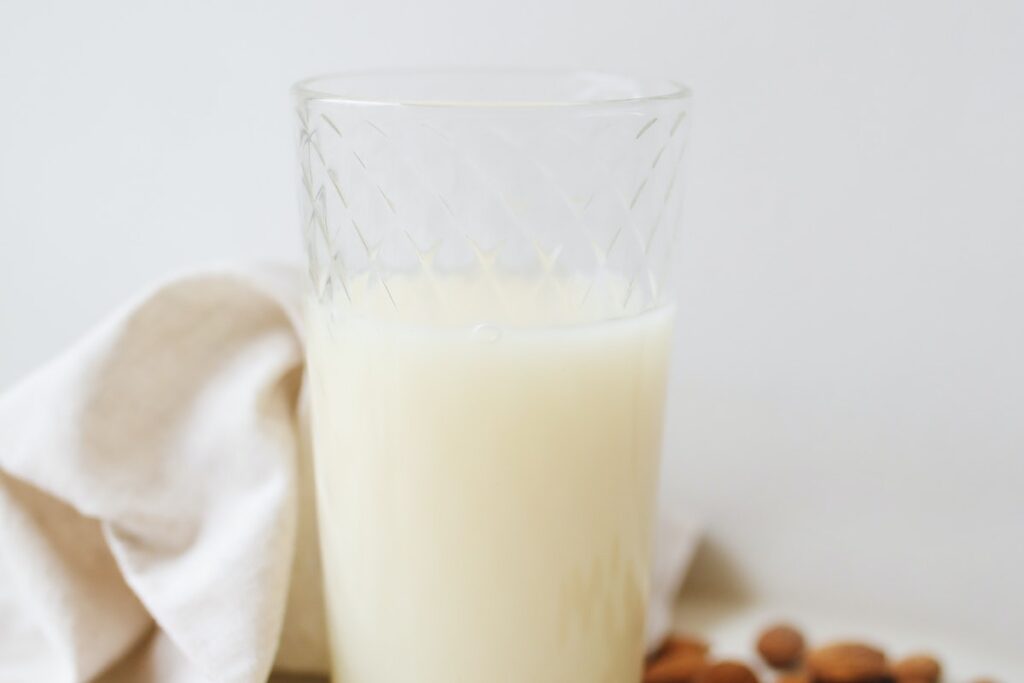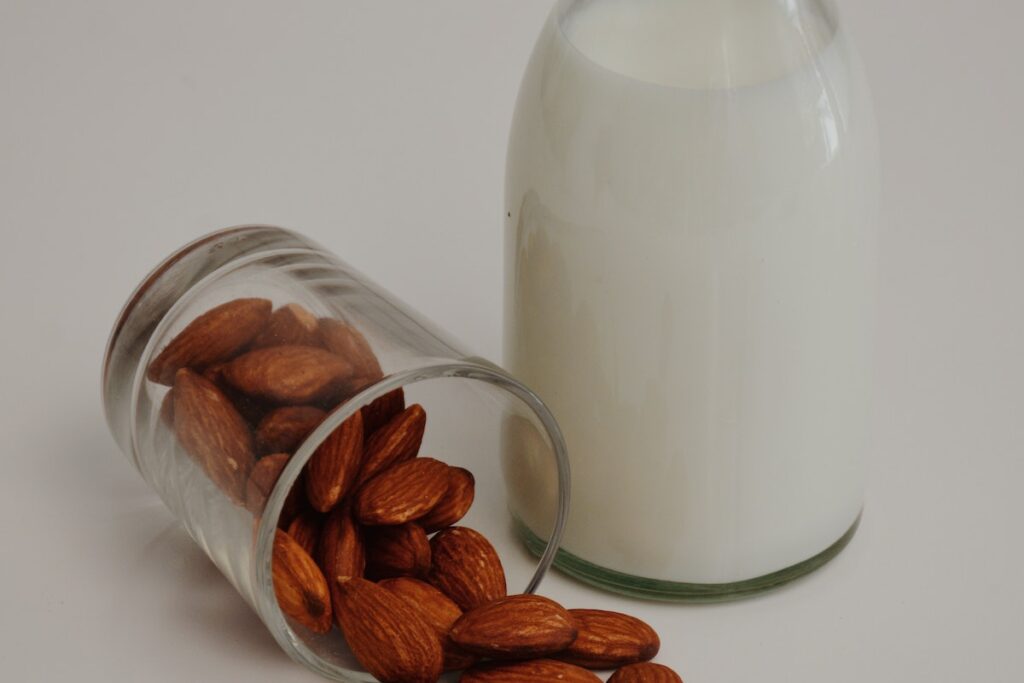Acne is a pretty common skin issue that has been linked to various factors, including diet. And get this: some folks are saying that almond milk, which has become super popular as a healthier alternative to regular milk, might actually be connected to those pesky pimples. It’s caused a bit of a stir among experts and people who swear by almond milk for their skin.
In this article

If you love milk or dairy products and have been dealing with stubborn acne breakouts, this article is for you. We’re going to dig deeper into the potential link between dairy and acne, and provide possible solutions for all you dairy enthusiasts out there!
What is almond milk?
Almond milk is a plant-based beverage made from almonds and water. It is a popular non-dairy alternative often consumed by those who are lactose intolerant, allergic to dairy, or following a vegan diet. Almond milk is made by soaking almonds, grinding them into a paste, and straining them to remove solids, leaving behind a creamy, nutty liquid.
It’s low in calories and sugar, high in vitamin E and healthy fats, but lower in protein than cow’s milk. Some commercial brands fortify almond milk with calcium and vitamin D but added sugars, stabilizers, and flavorings can be found in some store-bought versions, so checking the ingredient list and nutrition facts is advised.
Does almond milk cause acne?
While there isn’t much evidence that almond milk causes acne, it is believed that it could potentially trigger breakouts in certain individuals due to a couple of reasons. One reason is that almond milk is high in estrogen, which can contribute to hormonal acne. Additionally, almond milk contains omega-6 fatty acids that promote inflammation, potentially aggravating acne. Furthermore, the added sugars present in almond milk are considered unfavorable for skin health.
On the other hand, not all experts agree on the direct link between almond milk and acne. Research suggests that a diet high in omega-6 fatty acids, such as almond milk and other dietary sources, is associated with acne and increased inflammation. However, almond milk itself is unlikely to be the sole cause of acne

It’s also important to consider the broader picture. Dairy products, including regular milk, have been associated with acne due to the potential disruption of insulin levels when combined with high levels of refined foods and processed sugars in the Western diet. This suggests that factors beyond almond milk alone may contribute to acne development.
In the end, the impact of almond milk on acne may vary from person to person. Each person’s skin is unique, and factors like genetics, overall diet, lifestyle, and individual sensitivities can play a role in determining how dairy or other foods may affect their skin.
While some individuals may experience breakouts when consuming almond milk, others may not notice any adverse effects. It’s crucial to pay attention to your own body and observe how it responds to different dietary choices.
What to do if you notice acne when consuming almond milk?
If you notice acne when consuming almond milk, there are several steps you can take to manage the situation.
- Assess Your Intake: Almond milk contains omega-6 fatty acids and phytoestrogens, which can cause or exacerbate acne, particularly if you have hormone imbalances. However, it’s important to note that this typically only becomes an issue if you consume almond milk in large amounts.
- Consider Other Dietary Factors: While almond milk can potentially contribute to acne, it’s essential to examine your overall diet as well. High intake of other foods rich in omega-6 fatty acids or foods that spike your blood sugar levels may also lead to acne.
- Consult a Healthcare Provider: If you have persistent acne, it might be helpful to consult with a healthcare provider or a dermatologist. They can provide guidance based on your specific circumstances, such as hormonal imbalances or other underlying health conditions, which could be contributing to your acne.
- Try Different Non-Dairy Alternatives: If you suspect that almond milk might be causing your acne, you might want to try switching to other non-dairy milk alternatives. It’s possible that another type of milk, like soy or oat milk, might not have the same effect on your skin.
- Monitor Your Skin: Pay attention to how your skin responds when you make dietary changes. If your skin improves when you cut back on almond milk, it might be a sign that it was contributing to your acne.
Key Takeaway: Almond milk and acne, is it a fact or myth?
The connection between almond milk and acne is neither a clear fact nor a myth, as it depends on several factors.
- Almond milk has skin-healthy vitamins like A, D, and E but it’s also low in protein, which could cause post-meal blood sugar spikes that can potentially trigger acne.
- Almond milk contains high levels of omega-6 fatty acids, which may lead to inflammation and potentially acne when consumed in large amounts without a balance of omega-3 fatty acids.
- Furthermore, some dairy products, particularly skim milk, have been linked with acne, particularly in adolescence. So, almond milk could potentially be a better choice for those looking for a dairy alternative, although the overall diet and lifestyle also play significant roles.
Frequently asked questions (FAQ)
Got more questions about almond milk and acne? Check out some commonly asked questions about this topic below.
Is there a direct link between consuming almond milk and developing acne?
While some individuals report breakouts after consuming almond milk, it’s important to note that everyone’s skin and body react differently. There’s currently no definitive scientific evidence to establish a direct link between almond milk consumption and acne development. However, more research is needed in this area.
Could an ingredient in almond milk trigger acne?
Almond milk typically contains almonds, water, and sometimes sweeteners or stabilizers. None of these ingredients are known to directly cause acne. However, if you have a sensitivity or allergy to almonds, it might result in skin issues. It’s always recommended to consult with a healthcare professional if you notice any adverse reactions after consuming a new food.
Are there better non-dairy alternatives to almond milk for those concerned about acne?
If you’re worried about potential acne triggers, there are numerous non-dairy milk alternatives available, such as soy, oat, and rice milk. Each has different nutritional profiles and potential benefits. However, it’s essential to remember that diet is just one part of managing acne, and what works best will vary from person to person.
Final Word
The question “Does almond milk cause acne?” finds its answer intertwined with personal responses and ongoing research. Our bodies, unique in their reactions to food and environment, may view almond milk differently—some as a skin problem, others as a harmless or beneficial dietary element. Navigating diet and skin health can be complex, but with knowledge and curiosity, you can discover your path to skin health.
Found this exploration enlightening? Feel free to share this knowledge journey with your friends. And don’t forget, for more insights into the intricate world of diet and health, my blog is brimming with tips and discussions just waiting to be discovered!
